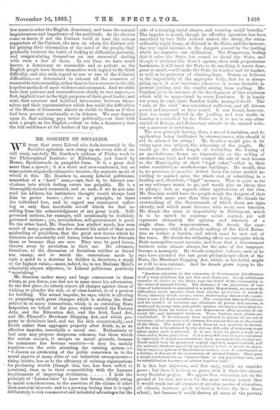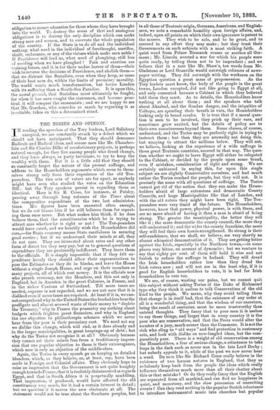MR. GOSCHEN ON SOCIALISM.
WE trust that every Liberal who feels interested in the Socialist agitation now rising up on every aide of us, will study carefully Mr. Goschen'a address of Friday week to the Philosophical Institute of Edinburgh, just issued by Messrs. Spottiswoode in pamphlet form. It is a great deal more than a speech ; it is a short and over-condensed, but on some points singularly exhaustive treatise, the separate merit of which is this. Mr. Goschen is, among Liberal politicians, somewhat of a " hard " man,—apt, that is, to distrust con- clusions into which feeling enters too palpably. He is a thoroughly-trained economist, and as such, if we do not mis- read his address, his instinctive thought would always lead him to prefer laissez faire as a principle, to leave the individual free, and to regard any consequent suffer- ing as only that inevitable set-off which we find re- sulting from the acknowledgment of any great truth. Self- governed nations, for example, will occasionally be foolishly- governed nations ; yet, nevertheless, self-government is good. On the other hand, Mr. Goschen has studied much, has seen much of many peoples, and has cleaned his mind of that most misleading of prejudices, that the great new forces which he distrusts are necessarily evil forces, either because he distrusts them or because they are new. They may be good forces, thrown away by unwisdom in their use. He advances, therefore, to the discussion of Socialism neither as friend nor enemy, and to watch the concessions made by such a mind to a doctrine he dislikes is, therefore, a study of the highest value,—must, indeed, be, lo use Madame Mohl's admirably-chosen adjective, to Liberal politicians positively " nourishing."
Mr. Goschen makes many and large concessions to those whom, as you listen, you feel are in some sense his adversaries. In the first place, he utterly rejects all charges against them of wishing to plunder the rich, or of class-hatred, or of a passion for levelling. The actual impulse, he says, which is effecting or proposing such great changes, which is making the State arbiter in so many transactions, which is so extending State Inspection on behalf of the poor, which carried the Factory Acts, and the Education Act, and the Irish Land Act, and Mr. Plimsoll's Merchant Shipping Act, and which pro- poses to distribute land, and tax the rich exceptionally, and divide rather than aggregate property after death, is, as an effective impulse, essentially a moral one. Enthusiasts or bad men may propose dangerous schemes, but those which the nation accepts, it accepts on moral grounds, because its conscience has become sensitive—it may be, unduly sensitive—to the evils attending the existing system :- "I discern an awakening of the public conscience as to the moral aspects of many sides of our industrial arrangements— rising doubts, less as to the efficiency of existing organisations for producing wealth (though this, too, has been called in question), than as to their compatibility with the humane requirements of improving civilisation I hold the principle of ' Laissez-faire to have lost favour, chiefly owing to moral considerations, to the assertion of the claims of other than material interests, and to a growing feeling that it is right deliberately to risk commercial and industrial advantages for the sake of reforming social abuses, and securing social benefits." The impulse is moral, though its effective operation has been
smoothed by two little noticed causes, the decay, the extra- ordinarily rapid decay, of distrust in the State, and the increase, the very rapid increase, in the dangers caused by the jostling which accompanies our civilisation. The Democracy, feeling that it rules the State, has ceased to dread the State, and though it criticises the State's agents, often with preposterous harshness, it will trust the State to do anything it wants done, great or small,—will make the State its teacher and its banker, as well as its protector of climbing-boys. Demos so believes in the impartiality of the aggregate body, that ho is always piling upon it new functions, whenever it seems desirable to prevent jostling, and the cruelty arising from jostling. Mr. Goschen gives an instance of the development of this readiness which will be appreciated by every Londoner. It is barely ten years, he says, since London traffic managed itself. The " rule of the road " was considered sufficient, and all drivers passed and repassed as they would. It was found, however, that too many suffered in the jostling, and now traffic in London is controlled by the Police as it is not in any other capital of Europe, and Democracy submits to the control with- out a murmur of resistance.
The new principle having, then, a moral foundation, and its application being facilitated by circumstances, why should it not be allowed its swing ? Mr. Goschen would give it its
swing upon one subject., the rehousing of the people. He would go the whole length of forbidding the letting of an unwholesome house as imperatively as the selling of unwholesome food, and would compel the sale of such houses to the Municipality at their "legal value,"—that is, their
value considered as unwholesome buildings. He would, that
is, we presume, in practice deduct from the value settled ac- cording to market price the whole cost of rebuilding in a
healthy and, therefore, "legal" manner. That is quite as far as any reformer wants to go, and would give us cheap sites in plenty ; but, as regards other applications of the idea,
Mr. Goschen would have the people weigh the dangers of their course with more care than they are doing. He dreads the overworking of the Government, of which there are signs already, and which must increase with every new function.
He dreads the want of impartiality in Parliament, which is to be raised to supreme social control, yet will represent ultimately the opinion and interests of a single class, the wage-receivers. He dreads the enor- mous expense, which is already making of the Civil Estim- ates so serious a burden, and which must be met out of the taxes. He dreads the withering effect on enterprise which State monopolies must exercise, and fears that a Government. business must almost always, for the sake of the taxpayer, become a monopoly. He dreads complete failures, such as he says have attended the last great philanthropic effort of the State, the Merchant Shipping Act, which, in his belief, might as well be non-existent. And he dreads grave injury to the national character :- "Another objection to the extension of Government interference is of a more insidious, but not loss real character. Every additional transfer of duties to the State saps the belief of the community in the value of natural liberty. For instance, if the protection of one class of individuals is entrusted to a public Department, no sooner do difficulties beset another class than similar protection is invoked. Every calamity which occurs, every shortcoming discovered, consti- tutes a case for fresh interference. The conviction that self-reliance and the conflict of interests are elements of power and success, is weakened at every turn, and public opinion discharges individual re- sponsibility from its duties in ono department after another of our social life and industrial business. Then, further, new claims are established. If Government have interfered in favour of one set of interests, other interests will clamour for similar favour at the hands of the State. The reality of such dangers can scarcely be denied, and the risk is heightened by the obvious difficulty of retracing steps taken under such conditions. It is ono thing to place a trade or a class under State protection. It is a very different thing to withdraw it, especially if moral considerations have prompted the original act. Trade might long be paralysed, capital expelled, wages lowered, and the national interests gonerilly prejudiced, before it would be possi- ble to repeal a system of Government control, even if condemned as a failure, in favour of the restoration of natural liberty. Once pass a moral condemnation on Laissez-faire' in any particular case, and its rehabilitation becomes an almost hopeless task."
It is this last objection, and this only, which we consider grave ; but then it is to us so grave, that it discredits almost every Socialist project. We oppose free education not on the ground of its cost, nor even for the more serious reason that it would crush out all separate or peculiar modes of education, all schools, however good, withering before the free State school ; but because it would destroy all sense of the pannts',
obligation to secure education for those whom they have brought into the world. To destroy the sense of that and analogous obligations is to destroy the only discipline which can make strong men and women, and to enervate the whole population of the country. If the State is to do all and the individual nothing, what need in the individual of forethought, sacrifice, thrift, endurance, or any of the virtues which make men noble ? If Providence will feed us, what need of ploughing, still less of weeding when we have ploughed ? Pain and exertion are training forces, and it is for their undue horror of them—their wish to reverse the decisions of Providence, and abolish them— that we distrust the Socialists, even when they keep, as some of their best men do, within the limits of pecuniary morality. The world wants much transformation, but better London with its suffering than a South-Sea Paradise. It is upon this, the moral ground, that Socialism must ultimately be fought, for when it has once caught the statesmen, and become prac- tical, it will conquer the economists ; and we are happy to see that Mr. Goschen, who concedes so much by regarding it as inevitable, takes on this a determined stand.



































 Previous page
Previous page